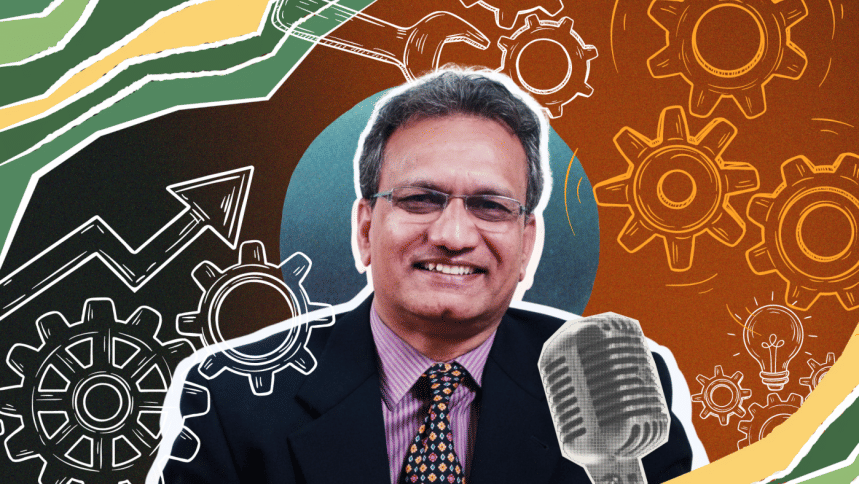Staying ahead of the employability curve

Dr Ajay Kela is the President & CEO of Wadhwani Foundation, a non-profit organisation that offers training modules in upskilling and entrepreneurship for graduates and young startup founders. Wadhwani Foundation has recently launched new AI-powered tools in Bangladesh which aims to impart crucial employability skills to Bangladeshis seeking a competitive edge in the modern job market.
With a Bachelor of Technology from IIT Bombay, India, and PhD from University of Rochester, USA, Dr Ajay Kela is a tech industry veteran who has been responsible for multi-million-dollar products at multinational firms such as General Electric and Autodesk, alongside years of experience in Silicon Valley and international software companies. In an interview with The Daily Star, Dr Ajay Kela shared the goals of the Wadhwani Foundation, what kind of skills a modern employer looks for, and the importance of upskilling for modern graduates.
What is the mission of the Wadhwani Foundation? What makes Bangladesh an ideal country for your foundation?
Our mission is to empower as many families around the world with at least one individual who can support their family with their living wage. Our primary targets are countries with large, growing youth populations, as well as countries with emerging economies; because that's where the vulnerability is high. Bangladesh is an excellent example of that. With a population of around 170 million, a huge percentage of it is youth. Yet, enough job opportunities are not there. As such, this is an ideal country for us to work in.
How does the Wadhwani Foundation help aspiring professionals with necessary upskilling for the modern competitive job market?
In this day and age, to earn enough to support a family of four, the skills demanded by employers are substantial. In the past, you could pass 12th grade and get a job that could support your family. But you can't do that today. This is because technology and innovation are moving at an alarming rate. With jobs gradually getting automated and AI reshaping the industry, lots of low-end jobs are getting killed. However, new high-end jobs are being created in place, for which you need higher-end skills to compete in the job market.
This is why we entered the space of upskilling - teaching everyone to 'learn to learn'. It's not enough if you just go to college and get a degree. You have to reinvent yourself every three to five years. While many technical skills are dying because of the rise of automation, evergreen skills such as communication, teamwork, problem-solving, and critical thinking. etc. will always remain. We are putting together these skills in a package and delivering them to graduates so they can learn these skills and apply them their whole life.
While employers call you for an interview for your technical skills, the decision to give a job is primarily based on your communication skills, attitude, teamwork, etc. As such, soft skills drive the decision to employ you or not. Even a potential promotion depends on your ability as a team player and your collaborative skills.
What about hard skills? What is the hard skill modern employers value the most?
Rather than 'soft skills' or 'hard skills', we call them 'employability skills', a combination of both. While we have modules on teamwork, collaboration, and critical thinking, we also have modules on digital literacy, which, nowadays, is being transformed into AI literacy.
Over the next 10 to 15 years, the key skill that will be required is how to communicate with the likes of ChatGPT and Google Bard to get the response that is relevant to you. Prompt engineering, which we are introducing a module on, will be an important skill that future employers will be looking for.
In your experience, which particular employability skill do Bangladeshis tend to lack the most?
Not just in Bangladesh but in almost every emerging economy country we have worked with, we have seen that the youth are barely exposed to the necessary employability skills for the modern job market. This is because no college or school is teaching them communication skills, teamwork, attitude, team-building, etc. This is the case in countries like India, Brazil, Mexico, the Philippines, and Indonesia, as well.
How do you think this gap in employability skills for modern youth can be fixed?
The curriculum needs to be changed. When we decided to provide modules on upskilling, we went to 2,000 employers around the world and asked them, "When you hire someone, what do you look for?" 30% answered 'hard skills', but the remaining 70% responded with various types of 'employability skills'. Most academic institutions are only focused on passing students. They aren't connected with what the industry wants, despite the fact that every student is going through 12 to 16 years of education to ultimately look for employment. In my recent discussion with the Bangladeshi government and the UCG-equivalent bodies, I requested them to look into changing some of the courses in the current curriculum. The defunct ones should be dropped in favour of lessons that help students move at the pace of the industry.
What kind of skills should a young entrepreneur develop to expand their startup's growth?
They used to say entrepreneurship is an inherent trait. But that's not true. Being a successful entrepreneur is like being an Olympian athlete. You need to have solid discipline and be resilient, persistent, and keep a singular focus on your end goal. You need to know how to embrace failure and never give up despite challenges. Focus on customer centricity, and adopt the necessary mindset changes.
What is your advice to young startup founders aiming to seek investment? What should they look out for?
That's a chicken and egg situation. For example, in Bangladesh, among 170 million people, you can identify many problems that need a solution. If you get the best and brightest minds to focus on solving those problems and in turn create products and services to enable those solutions, you can address the problem and create jobs in return.
No one is going to invest in you unless you have that entrepreneurial mindset and hunger. An investor will be interested in you once they see that you have understood the market, understood the problem you want to address, designed a scalable solution to address the problem, and the solution is something people are willing to pay in money for.

 For all latest news, follow The Daily Star's Google News channel.
For all latest news, follow The Daily Star's Google News channel. 








Comments